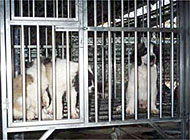Campaign seeks to stop use of St Bernards for meat in China

The St Bernard, recognised for centuries as a brave alpine rescuer, could be in need of rescuing itself. A petition has been handed to the Swiss government calling for it to help halt the use of these dogs for meat in China.
Eleonore Moser, a Geneva-based animal rights campaigner, collected 11,000 signatures from St Bernard breeders and owners all over the world to raise awareness of the treatment of these quintessentially Swiss animals.
Moser wants Bern to put pressure on the Chinese government to shed light on the practices in breeding centres that intensively rear St Bernards for slaughter.
“Unlike other campaigns, which have called for a boycott of Chinese goods, we are asking for a dialogue with the Chinese,” Moser told swissinfo.
A response from the Swiss Economics Ministry could be forthcoming, although it is not obliged to answer Moser’s petition. Moser says she will step up her campaign if the federal authorities do not act.
The campaign against this increasingly lucrative trade has the support of Prince Saddrudin Aga Khan and the French film actress turned animal rights campaigner, Brigitte Bardot. So far she has not opened up the petition to members of the public for fear of whipping up anti-Chinese sentiment.
Moser founded SOS St Bernard Dogs International after visiting a St Bernard farm where she saw 70 dogs used for breeding being kept in tiny cages. Hers is one of a number of campaigns encouraging Western dog breeders not to send pedigree animals to Asia.
One Chinese website on breeding St Bernards for their flesh boasts that the dog’s meat is “fresh, tender, tasty and delicious”. Dog meat is marketed in China as a luxury health food, and often St Bernards are mated with local breeds to improve the general quality of the meat.
The Swiss breed is favoured because it is resistant to disease and eats less than similar types of dogs. The females’ puppy-bearing years are comparatively long and their litters are big. The puppies also grow more quickly than other breeds, making them ready for butchering in a matter of months.
“It all boils down to money,” Moser says.
She says there is no evidence yet of large-scale slaughtering of St Bernards. With a pedigree animal costing upwards of SFr 3,000 ($1,829), efforts seem to have been concentrated on boosting the number of animals through breeding.
“We don’t know exactly how many dogs there are, but they are being bred in an industrial way. We think they may even have sufficient dogs not to have to import any more,” Moser says.
“The more they breed, the less they will cost, and then St Bernards will be like a regular meat dog,” she explains
One of Eleonore Moser’s biggest concerns is that the dogs are routinely tortured before being slaughtered because it is believed that raising their adrenalin levels improves the taste of the meat and acts as an aphrodisiac.
Moser says that one Chinese dog breeder, whose centre is funded by the government, told her he had recouped his initial investment within two years and predicted that it was “only a matter of time before the dog meat industry takes off … it will gradually become like raising cows and sheep”.
She said he boasted that dog-farming would be three to four times as profitable as raising pigs or poultry.
China has a long tradition of eating dogs – these animals never having been accorded the same status as they enjoy in Europe. Times of famine have driven people to eating anything.
“If you absolutely have to eat dogs, at least you can slaughter them correctly,” Moser says.
“As for breeding St Bernards for meat, this has been a phenomenon in China only in the last five years. They only use them because they are more profitable than other breeds,” she adds.
St Bernards have been rescuing people for centuries, and Moser believes her campaign is a way of returning the favour.
“Historically, the St Bernard is a special dog for the Swiss. It deserves special attention,” she says.
by Roy Probert

In compliance with the JTI standards
More: SWI swissinfo.ch certified by the Journalism Trust Initiative
You can find an overview of ongoing debates with our journalists here. Please join us!
If you want to start a conversation about a topic raised in this article or want to report factual errors, email us at english@swissinfo.ch.